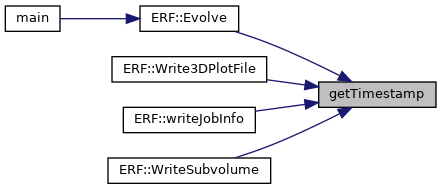ERF_EpochTime.H File Reference
#include <string>#include <sstream>#include <iomanip>#include <ctime>
Include dependency graph for ERF_EpochTime.H:

This graph shows which files directly or indirectly include this file:

Go to the source code of this file.
Functions | |
| AMREX_GPU_HOST AMREX_FORCE_INLINE std::time_t | getEpochTime (const std::string &dateTime, const std::string &dateTimeFormat) |
| AMREX_FORCE_INLINE std::string | getTimestamp (const amrex::Real epoch_real, const std::string &datetime_format, bool add_long_frac=true) |
Function Documentation
◆ getEpochTime()
| AMREX_GPU_HOST AMREX_FORCE_INLINE std::time_t getEpochTime | ( | const std::string & | dateTime, |
| const std::string & | dateTimeFormat | ||
| ) |
◆ getTimestamp()
| AMREX_FORCE_INLINE std::string getTimestamp | ( | const amrex::Real | epoch_real, |
| const std::string & | datetime_format, | ||
| bool | add_long_frac = true |
||
| ) |
Referenced by ERF::Evolve(), ERF::Write3DPlotFile(), ERF::writeJobInfo(), and ERF::WriteSubvolume().
Here is the caller graph for this function:

